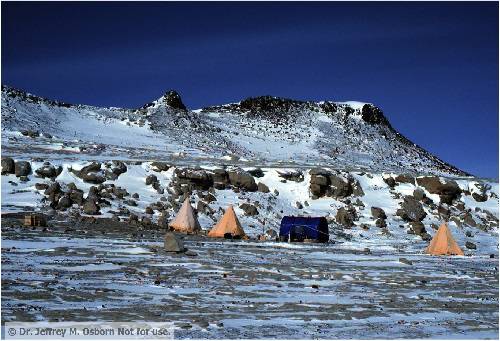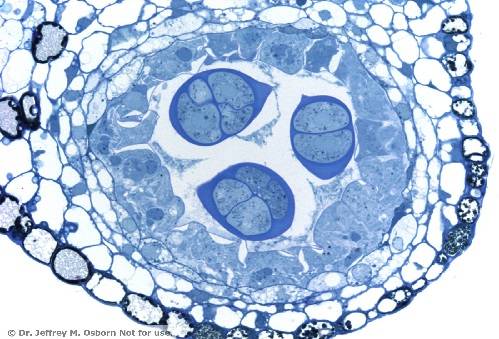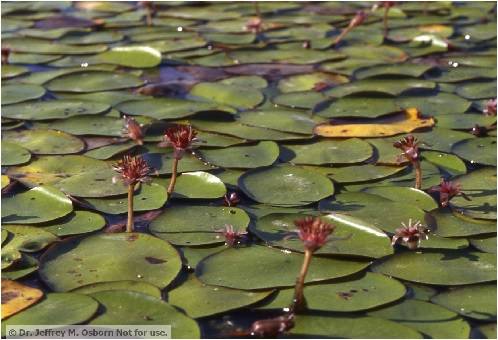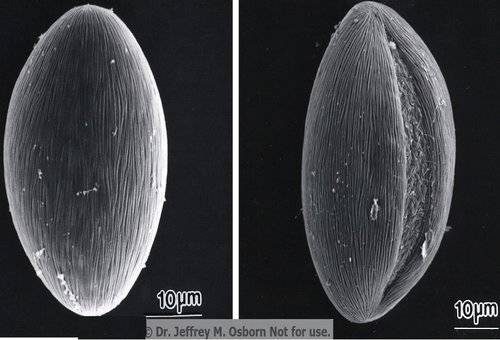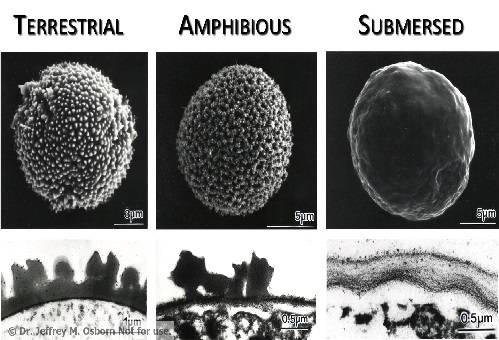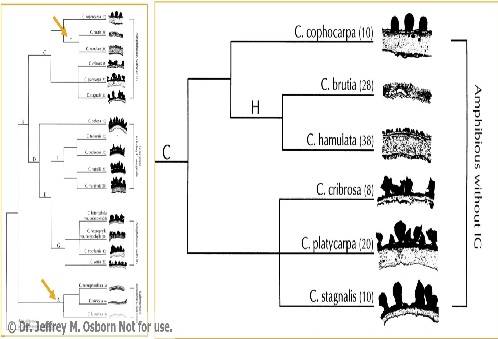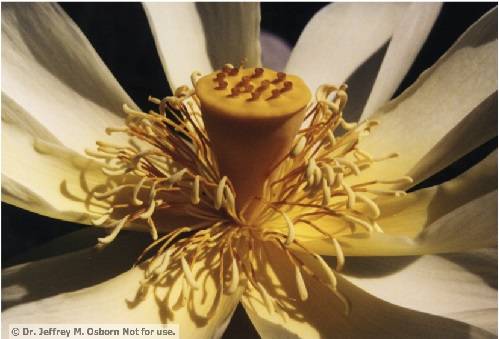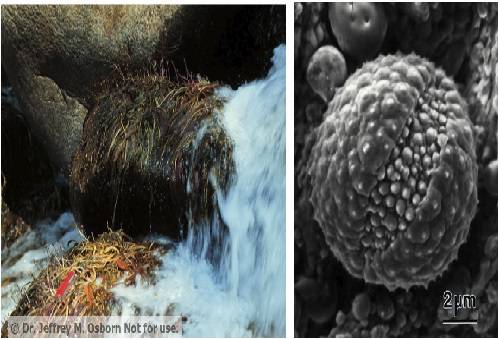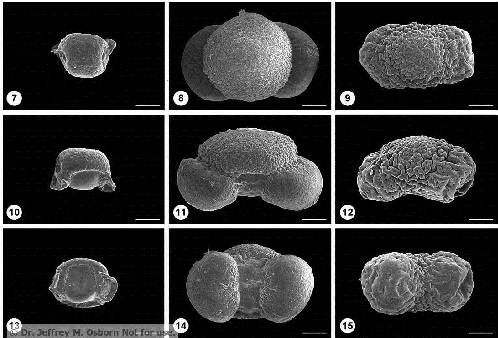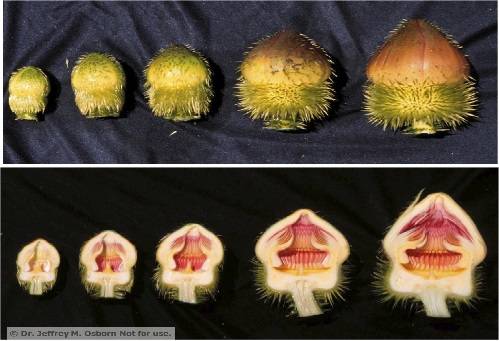Catalog Description
4 hours (offered spring – even years)
Comprehensive studies of the internal structure of vascular plants, focusing mainly on the anatomy of flowering plants. The course emphasizes structure-function relationships and anatomical adaptations of plants to various environmental conditions.
Course Syllabus
| Date | Day | Lect/Lab | Lecture/Laboratory Topic |
|---|---|---|---|
| 1/15 | T | Lect | Introduction |
| 1/16 | W | Lab | Microscopy, Microtechnique & 3 Tissue Systems (1) |
| 1/17 | TH | Lect | No formal class |
|
|
|||
| 1/22 | T | Lect | The Plant Cell |
| 1/23 | W | Lab | The Plant Cell: I & II (2, 3) |
| 1/24 | TH | Lect | The Plant Cell; The Cell Wall |
|
|
|||
| 1/29 | T | Lect | The Cell Wall; Parenchyma |
| 1/30 | W | – | No formal class – University-wide Conference Day |
| 1/31 | TH | Lab | Simple Tissues I (4) |
|
|
|||
| 2/5 | T | Lect | Parenchyma; Collenchyma |
| 2/6 | W | – | Lecture & Lab Exam 1 |
| 2/7 | TH | Lect | Collenchyma; Sclerenchyma |
|
|
|||
| 2/12 | T | Lect | Sclerenchyma; Primary Xylem |
| 2/13 | T | Lect | Simple Tissues II (5); Primary Xylem (6) |
| 2/14 | TH | Lect | Primary Xylem; Secondary Xylem |
|
|
|||
| 2/19 | T | Lect | Secondary Xylem; Primary Phloem |
| 2/20 | W | Lab | Secondary Xylem (7);Â Phloem (8) |
| 2/21 | TH | Lect | Secondary Phloem |
|
|
|||
| 2/26 | T | Lect | The Vascular Cambium |
| 2/27 | W | Lab | The Vascular Cambium & The Periderm (9) |
| 2/28 | TH | Lect | The Vascular Cambium; Periderm |
|
|
|||
| 3/5 | T | Lect | Periderm; The Epidermis |
| 3/6 | W | – | Lecture & Lab Exam 2 |
| 3/7 | TH | Lect | The Epidermis; Secretory Cells, Tissues, & Structures |
|
|
|||
| 3/12 | T | – | Midterm Break |
| 3/13 | W | – | Midterm Break |
| 3/14 | TH | – | Midterm Break |
|
|
|||
| 3/19 | T | Lect | Roots |
| 3/20 | W | Lab | The Epidermis (10); Secretory Structures (11); The Root (12) |
| 3/21 | TH | Lect | Roots |
|
|
|||
| 3/26 | T | Lect | Stems |
| 3/27 | W | Lab | The Root (12); The Stem (13) |
| 3/28 | TH | Lect | Stems |
|
|
|||
| 4/2 | T | Lab | Leaves |
| 4/3 | W | – | Lecture & Lab Exam 3 |
|
|
|||
| 4/9 | T | Lect | Flowers |
| 4/10 | W | Lab | The Leaf (14) |
| 4/11 | TH | – | Undergraduate Research Symposium |
|
|
|||
| 4/16 | T | Lect | Flowers |
| 4/17 | W | Lab | The Flower (15) |
| 4/18 | TH | Lect | Fruits |
|
|
|||
| 4/23 | T | Lect | Seeds |
| 4/24 | W | Lab | Work on projects |
| 4/25 | TH | Lect | Work on projects |
|
|
|||
| 4/30 | T | Lect | Ecological Plant Anatomy |
| 5/1 | W | Lab | Seeds and Fruits (16); Paleobotany & Fossil Plant Anatomy (17) |
|
|
|||
| 5/2 | TH | Lect | Ecological Plant Anatomy |
|
|
|||
| 5/7 | T | Lect | Group Presentations |
|
|
|||
| 5/13 | M | – | Lecture & Lab Exam 4 (7:30-9:20 am) |
Course Information
| Instructor: | Dr. Jeffrey M. Osborn |
| Magruder Hall 251 | |
| 785-4017 | |
| Office Hrs: | Mon: 9:00 am – 10:30 am |
| Thurs: 10:30 am – 12:00 pm | |
| & by appointment | |
| Lecture: | 9:00 10:20 am T H, Magruder Hall 111 |
| Laboratory: | 8:30 11:20 am – W, Magruder Hall 104 |
| Section 62 – 2:30 pm – 5:20 pm, Tuesday, Magruder Hall 117 | |
| Text: | Integrative Plant Anatomy, by William C. Dickison, 2000. (Harcourt Academic Press, San Diego, CA) |
| Lab Manual: Plant Anatomy: Laboratory Exercises for Biology 313, by Jeffrey M.Osborn (2001). | |
| Biology Seminars: The Truman Biology discipline hosts a weekly Biology Seminar Series in which professional biologists from around the state and country visit our campus to present up-to-date research seminars. Biologists, whose research interests are specialized in a wide variety of sub disciplines, including Botany, will present talks over the course of the semester. You are invited and encouraged to attend all seminars. The schedule will be posted in the laboratory, and regular announcements will be made in class to inform you of the weekly talks. | |
| Bulletin Boards: Botany “Bulletin Board” is located in Science Hall outside of the Truman Herbarium (room 245). Botanically relevant information is posted on this board and might be of interest to you (e.g., Botany Courses at Truman, Fellowships, Job Announcements, Graduate Schools, Upcoming Meetings, etc.). | |
Course Policies
- Evaluations:
Lecture – Four examinations will be taken during the course, and each of these will principally cover information presented since the previous exam. The format of all exams will be diverse, consisting of several types of questions (e.g., objective, short answer and long answer).Laboratory – Four examinations will be taken during the course, and each of these will principally cover information presented since the previous exam. Lab exams will cover the same material as that on lecture exams and will be practical in nature; they will be taken immediately before each lecture exam. Each student will also employ a variety of techniques throughout the duration of the semester in the preparation of a research project. The types of projects available will be discussed later in the semester. In addition, each student will be asked to keep and turn in a laboratory notebook in which detailed drawings of the various plant cells, tissues, and organs observed in the course should be archived.
Make-up exams and quizzes – Make-ups will not be given unless the absence is due to either some type of an emergency or an officially approved university activity and documented evidence is presented. For an emergency situation, please contact the instructor as soon after the occurrence as possible, preferably within 24 hours of the scheduled exam. As for absences due to university activities, the instructor must be notified prior to the exam.
Graduate students – Graduate students enrolled in either Biology 518 or 618 will be expected to prepare a research paper in addition to the other course requirements. Students should meet with the instructor early in the semester to discuss the nature of the paper and potential topics. Graduate students will also be expected to perform at a ‘higher’ level on the lecture exams.
Final Exams – The date of the lecture final is pre-scheduled by the University, and will not be given early.
- Grading Policy:
Grades will be based on an accumulation of up to 800 points. Lecture (60%) Lecture exams (4 @ 120 pts each) 480 pts Lab (40%) Lab exams (4 @ 50 pts each) 200 pts Research project 70 pts Lab notebook 50 pts ——-
800 ptsFinal grades will be based on the following scale. A 90 – 100% B 80 – 89% C 70 – 79% D 60 – 69% F ≤ 59% - Attendance:
As Plant Anatomy is an upper-level class, regular attendance in all lectures and laboratories is expected.


